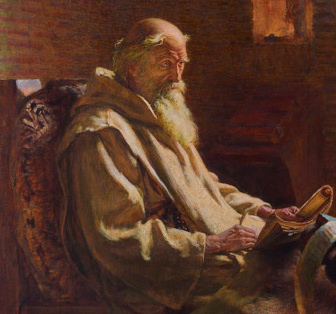Daily Office Readings for the feast day of Bede, the Venerable, 2018:
In our Gospel today, Jesus talks of the Kingdom of Heaven like being a net that caught fish of every kind. I think it’s safe to say the venerable Bede modeled the net! Monk, priest, prolific theologian, historian, and author (he wrote over 40 books, his most famous being the Historia ecclesiastica gentis Anglorum, or An Ecclesiastical History of the English People). In addition to being given the title of “Venerable”, he is widely known as the father of English history. If you sang either hymn 217 or 218 in the Hymnal 1982 for Ascension, you sang a hymn in which Bede had penned the words.
Most of Bede’s life was spent in monastic life. Born in either 672 or 673, he was sent to the monastery of St. Peter in Northumbria at age eight. As a teen, he escaped the fate of a plague that swept through the region. Later, he called the monastery at Jarrow his home.
He did not, however, live a cloistered life. During his lifetime, he traveled to several monasteries in the region from Lindisfarne to York, was a guest in the court of King Ceolwulf of Northumbria, and taught many theologians (Alcuin might have been his most famous pupil.) When Bede was born with theology, he worked on math as it relates to theology, math that we still use!. He is the person who helped establish the method by which the Western church calculates the date of Easter (parts of Bede’s work still exist in the present day computation), and he is responsible for our present practice of using calendar dates marking time roughly after the birth of Jesus Christ (A.D. or Anno Domini, now referred to as the less Christocentric C.E. or Common Era.)
Perhaps though, the most important quality Bede brought to Christianity was not facts or figures or theology, but passion. All of his life, Bede was a passionate learner and saw the abilities of the human mind as a way of expressing love of God. As he self-reflected, “I have devoted my energies to the study of the scriptures, observing monastic discipline, and singing the daily services in church; study, teaching, and writing have always been my delight.” He also described this passion as being the means by which he worshiped God: “I was no longer the centre of my life and therefore I could see God in everything.”
Bede died in 735, not long after completing his final work, a translation of the Gospel of John. Not long before he died, he had a conversation with a young assistant, who said, “Dear master, there is still one sentence that we have not written down.”
“Write quickly,” said Bede.
“There. Now it is written.” said his assistant.
“You have said well,” replied Bede. “It is at an end. All is finished.” Although his life was at an end, his works live on.
How do you find passion in your life through the love of learning? How might it take you on a journey to better discover your relationship with a loving God?
Maria Evans splits her week between being a pathologist and laboratory director in Kirksville, MO, and gratefully serving in the Episcopal Diocese of Missouri as Interim Pastor at Church of the Good Shepherd and Chaplain of the Community of St. Brigid, both in Town and Country, MO.

